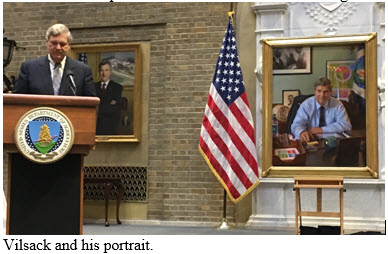WASHINGTON, Dec. 2, 2016 - There's an intriguing new twist in President-elect Donald Trump’s search for an agriculture secretary. North Dakota Sen. Heidi Heitkamp will be meeting today in New York with Trump and Vice President-elect Mike Pence and the Agriculture post is expected to be on the agenda.
A Trump spokesman wouldn’t discuss the meeting, and Heitkamp insisted that she didn’t know what Trump wanted to talk to her about. But North Dakota’s Republican congressman, Kevin Cramer, who has ties to the Trump operation, told Agri-Pulse that the meeting is about USDA. Cramer said he learned about the meeting from the Trump team earlier in the week.
Heitkamp told Agri-Pulse that she planned to talk to Trump about the “economic uncertainty” in rural America “in a period of low commodity prices.”
Heitkamp faces a tough re-election race in 2018, but taking the cabinet post would clear the way for Cramer to take it even earlier by running it in a special election. Trump spokesman Jason Miller said Heitkamp would be an asset to the Trump administration “in any role or capacity.”
Vilsack weighs in on next USDA secretary. Agriculture Secretary Tom Vilsack’s criteria for his successor hasn’t changed. He thinks Trump should choose a governor or someone with experience at USDA.
“It takes someone who understands the whole portfolio of the department … and balance multiple priorities in multiple areas,” Vilsack said at a rural housing event yesterday. “That’s why I’ve suggested that a governor … would be a good person to run this place.”
Vilsack, who was speaking before the announcement of the Heitkamp-Trump meeting, told Agri-Pulse that Chuck Conner would be a good fit for the department because of his experience there. Conner, the president of the National Council of Farm Cooperatives, served as deputy agriculture secretary during the George. W. Bush administration.
Later in the day, Vilsack
attended the unveiling of his official portrait, which will hang in the
atrium of USDA’s Whitten building. The portrait, painted by Iowa artist
Rose Frantzen, includes a poster of the My Plate dietary guide developed
under his watch. There's also a plant-based water bottle to represent the USDA
Bio-Preferred Program.

Walden gets key House committee post. Republican Rep. Greg Walden, who represents an agricultural region of eastern Oregon, will take over the chairmanship of the House Energy and Commerce Committee, succeeding the term-limited Fred Upton.
The GOP steering committee selected Walden over Illinois Rep. John Shimkus, a staunch advocate for ethanol. Energy and Commerce has broad jurisdiction over food safety and energy and environmental policy.
Walden’s victory was seen as a reward for his successful chairmanship of the Republican congressional campaign operation this year. Walden, who grew up on an orchard, was named a “Champion of Agriculture” this year by American Agri-Women.
Sage grouse rider falls off defense bill. Congressional negotiators scrapped a provision in a defense authorization bill that would prevent the federal government from carrying out a sage grouse management plan in states that have their own. The provision had been holding passage of the defense bill.
The issue has lost some of its urgency now following Trump’s election. A spokesman for House Natural Resources Chairman Rob Bishop, R-Utah, said the issue will be raised with the next interior secretary
FWS adds candidate species for endangered list. The eastern population of the gopher tortoise is one of 30 species the Fish and Wildlife Service is classifying as candidates for listing under the Endangered Species Act. Candidate species are those for which the service has enough information to propose for listing, but cannot do so because of deadlines under existing court agreements and a lack of funding.
The agency says habitat fragmentation, destruction, and modification is the primary threat to the gopher tortoise’s continued existence -- in particular, conversion of longleaf pine forests “to incompatible silvicultural or agricultural habitats.” Urbanization and the spread of invasive species are other threats.
The number of species on the ESA waiting list is now the lowest it has been since the candidate list was created in 1975.
Pew poll finds consumer skepticism of GMOs. A new poll by the Pew Research Center illustrates the continued challenges that the farm and food sector faces in reassuring consumers about the health and safety of conventional agriculture.
According to the poll, 55 percent of American believe that organically grown produce is healthier than conventionally grown varieties. There also is a large minority - nearly 40 percent of the country - that believes that genetically engineered foods are less healthful than conventional products.
That may be because consumers believe there is less consensus among scientists about the safety of GMOs than there really is. According to the poll, only 14 percent of consumers believe that almost all scientists believe that biotech foods are safe. And fewer than one in five consumers, or 19 percent believe that scientists understand the health effects of GMOs “very well.”
“The divides over food do not fall along familiar political fault lines,” the researchers say. “Nor do they strongly tie to other common divisions such as education, income, geography or having minor children. Rather, they tie to individual concerns and philosophies about the relationship between food and well-being.”
Bill Tomson and Steve Davies contributed to this report.
#30
For more news, go to: www.Agri-Pulse.com

